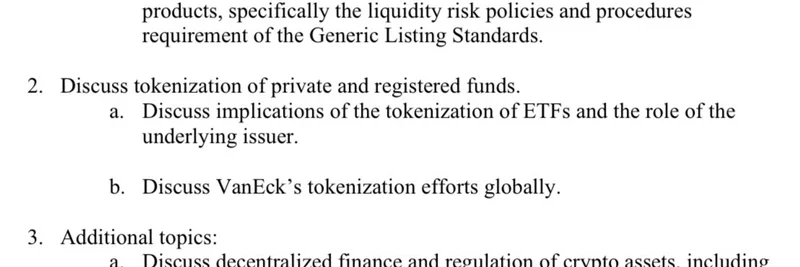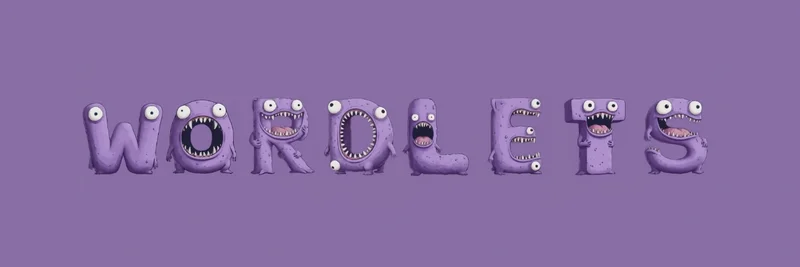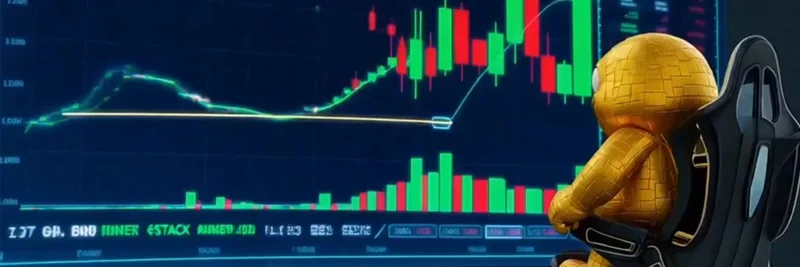In the fast-evolving world of crypto, big players like VanEck are pushing boundaries to bridge traditional finance with blockchain innovation. Recently, ETF expert Nate Geraci shared a tweet highlighting VanEck's meeting with the SEC's Crypto Task Force. This isn't just another regulatory chat—it's a deep dive into how crypto products, including those potentially involving meme tokens, could shape the future of investing.
The agenda, as posted in the tweet, covers everything from ETF standards to global tokenization efforts. Let's break it down and see what it means for the meme token community, where community-driven assets like Dogecoin or emerging Solana-based memes could find new legitimacy through tokenized structures.
VanEck's Crypto and Commodity Products Overview
VanEck, a top-tier ETF issuer, kicked off the discussion with an overview of their commodity- and crypto-based exchange-traded products. These are investment vehicles that track assets like Bitcoin or Ethereum, making them accessible to everyday investors without needing to hold the coins directly.
A key point was the applicability of proposed "Generic Listing Standards" for these products to liquid staking tokens. Liquid staking lets you stake your crypto (like ETH) to earn rewards while keeping a tradable token representing your staked amount. For meme tokens, this could mean more utility—imagine staking a meme coin in an ETF wrapper, boosting liquidity and appeal without the usual volatility risks.
They also touched on staking policies, focusing on liquidity risk management. In simple terms, staking locks up assets for rewards, but VanEck wants clear rules to ensure these products remain easy to trade. This is huge for meme enthusiasts, as many meme projects incorporate staking for community rewards, and regulatory clarity could attract institutional money.
Tokenization of Funds: A Game-Changer for ETFs
Moving on, the meeting delved into tokenizing private and registered funds. Tokenization means turning real-world assets or funds into blockchain tokens, enabling fractional ownership and 24/7 trading.
Specifically, they discussed the implications of tokenizing ETFs and the role of the underlying issuer. ETFs are already popular for their low costs and diversification, but tokenizing them could make them interoperable with DeFi protocols. For meme tokens, this opens doors—picture a meme-themed ETF that bundles popular tokens like PEPE or SHIB, tokenized for global access.
VanEck shared their global tokenization efforts, showing they're not just talking; they're building. They've been active in Europe and beyond, experimenting with tokenized bonds and funds. This global perspective could influence U.S. regulations, potentially allowing meme token projects to tokenize and list as more structured products.
Broader Topics: DeFi, Regulations, and Asset Custody
The agenda wrapped up with additional hot topics in crypto. First, decentralized finance (DeFi) and regulating crypto assets, including tokenized securities and initial coin offerings (ICOs). DeFi platforms let users lend, borrow, and trade without banks, but regs are murky. Many meme tokens launch via fair launches or ICO-like sales, so clearer rules could prevent scams and foster innovation.
They compared this to the current securities framework, highlighting gaps. For meme creators, this means potential pathways to legitimize launches, turning viral hype into compliant, tokenized assets.
Finally, they covered the Advisers Act Custody Rule and amendments for digital assets, including Multi-Party Computation (MPC) for safekeeping. MPC is a secure way to manage private keys across multiple parties, reducing hack risks. In the meme world, where rug pulls and security breaches are common, adopting MPC could build trust and attract more users.
Community Buzz and Meme Token Implications
The tweet sparked reactions on X, with users speculating on meme-specific ETFs. One mentioned a "$PENGU ETF," nodding to penguin-themed memes on Solana, while another asked "Wen ETF $DOG?"—likely referring to Dogecoin or similar dog memes. This shows the community's excitement: if VanEck's push succeeds, we could see meme tokens integrated into mainstream ETFs, blending fun with finance.
Overall, this meeting signals progress toward a more inclusive crypto landscape. For blockchain practitioners and meme token fans, it means watching for ETF approvals that could include staking yields or tokenized memes. Stay tuned—VanEck's efforts might just meme-ify Wall Street.
If you're diving into meme tokens, check out our knowledge base on top meme launches or DeFi integrations for more insights.




